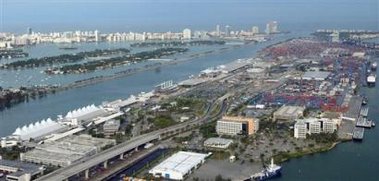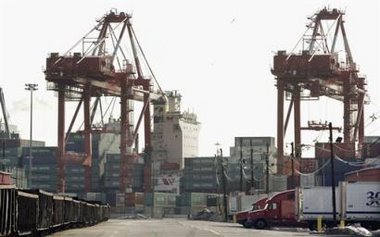 An aerial view of the Port of Miami is shown in this May 26, 2005 file photo. Florida Gov. Jeb Bush said Tuesday, Feb. 21, 2006, that his brother, President Bush, would adequately protect national security as part of the federal government's approval of the sale of a ports operator to a state-owned company in the United Arab Emirates. Under a proposed deal, a British company that has been running some operations at six U.S. ports would be acquired by Dubai Ports World. The British company owns a 50 percent share in the Port of Miami Terminal Operating Co. (AP Photo/Alan Diaz, File)
An aerial view of the Port of Miami is shown in this May 26, 2005 file photo. Florida Gov. Jeb Bush said Tuesday, Feb. 21, 2006, that his brother, President Bush, would adequately protect national security as part of the federal government's approval of the sale of a ports operator to a state-owned company in the United Arab Emirates. Under a proposed deal, a British company that has been running some operations at six U.S. ports would be acquired by Dubai Ports World. The British company owns a 50 percent share in the Port of Miami Terminal Operating Co. (AP Photo/Alan Diaz, File)Portgate has just taken a turn into the Twilight Zone. This is from Yahoo News:
WASHINGTON - The Bush administration secretly required a company in the United Arab Emirates to cooperate with future U.S. investigations before approving its takeover of operations at six American ports, according to documents obtained by The Associated Press. It chose not to impose other, routine restrictions.
As part of the $6.8 billion purchase, state-owned Dubai Ports World agreed to reveal records on demand about "foreign operational direction" of its business at U.S. ports, the documents said. Those records broadly include details about the design, maintenance or operation of ports and equipment.
The administration did not require Dubai Ports to keep copies of business records on U.S. soil, where they would be subject to court orders. It also did not require the company to designate an American citizen to accommodate U.S. government requests. Outside legal experts said such obligations are routinely attached to U.S. approvals of foreign sales in other industries.
"They're not lax but they're not draconian," said James Lewis, a former U.S. official who worked on such agreements. If officials had predicted the firestorm of criticism over the deal, Lewis said, "they might have made them sound harder."
The conditions involving the sale of London-based Peninsular and Oriental Steam Navigation Co. were detailed in U.S. documents marked "confidential." Such records are regularly guarded as trade secrets, and it is highly unusual for them to be made public.
The concessions — described previously by the Homeland Security Department as unprecedented among maritime companies — reflect the close relationship between the United States and the United Arab Emirates.
The revelations about the negotiated conditions came as the White House acknowledged
President Bush was unaware of the pending sale until the deal had already been approved by his administration.A container ship is loaded at Port Newark in Newark, N.J., Tuesday, Feb. 21, 2006. President Bush said Tuesday that a deal allowing an Arab company to take over six major U.S. seaports should go forward and that he would veto any congressional effort to stop it. (AP Photo/Mike Derer)
Secret deals of future U.S. investigations into DP World's business records in exchange for the sale of the ports? DP business records would not be maintained on U.S. soil, where they could be accessed by a court order? No American representative to DP World that would accommodate the U.S. government's requests? This Portgate deal seems like it was negotiated, then publicly presented by the Keystone Kops, rather than a competent U.S. government and White House. Of course, now that this secret agreement is public, you can bet there is going to be an even greater firestorm in both Congress, and the liberal and progressive blogosphere. Concerning the details of this secret agreement:
Dubai Port's top American executive, chief operating officer Edward H. Bilkey, said the company will do whatever the Bush administration asks to enhance shipping security and ensure the sale goes through. Bilkey said Wednesday he will work in Washington to persuade skeptical lawmakers they should endorse the deal; Senate oversight hearings already are scheduled.
"We're disappointed," Bikley told the AP in an interview. "We're going to do our best to persuade them that they jumped the gun. The UAE is a very solid friend, as President Bush has said."
Under the deal, the government asked Dubai Ports to operate American seaports with existing U.S. managers "to the extent possible." It promised to take "all reasonable steps" to assist the Homeland Security Department, and it pledged to continue participating in security programs to stop smuggling and detect illegal shipments of nuclear materials.
The administration required Dubai Ports to designate an executive to handle requests from the U.S. government, but it did not specify this person's citizenship.
It said Dubai Ports must retain paperwork "in the normal course of business" but did not specify a time period or require corporate records to be housed in the United States. Outside experts familiar with such agreements said such provisions are routine in other cases.
This whole Portgate sale is a colossal screw-up. The problem with this sale isn't whether the sale to DP World is right or wrong, but rather the negotiations and the public disclosure of the sale was handled in a furtive and secretive way. The Bush White House went about in pushing this sale through without any congressional or public hearings. What we get from the Bush administration is this attitude of "We know what we're doing, so we don't need your comments." We hear from President Bush that security concerns have been addressed through secret government agencies, even though Defense Secretary Don Rumsfeld didn't know about the port sale. Even President Bush didn't know about the port sale? Like it or not, this is a public relations disaster, in the magnitude of a tsunami swamping these ports!
And now we've got secret agreements with this port sale.
The sad thing is that this sale may have gone through, had the Bush White House quietly promoted this sale through congressional leaders of both political parties, and allowed public hearings regarding this sale--and not playing the political campaigning PR-spin that they are accustomed to--this port sale may have gone through without a problem. The security and terrorism issues would have certainly been raised, but real bi-partisan negotiations and compromise could have addressed these issues. The details of the port sale would have to be adapted to reflect new congressional legislation that would address these security and terrorism concerns. The American public would have had their views reflected in public hearings and congressional reviews. There is nothing to say that this port sale could not have gone through. The issue here is that for the port sale to go through, there had to be honest transparency and open debate regarding this sale. But instead of transparency, the Bush White House decided to go the secretive, furtive way of trying to ram this deal down both Congress, and the American public's throats.
And they are sowing the discontent that is now being generated as a result of this deal.

No comments:
Post a Comment